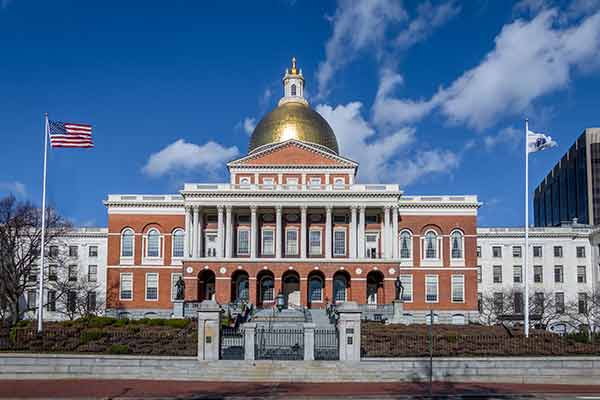


Policy Driving Changes

Commonwealth of Massachusetts
The Office of Climate Innovation and Resilience set goals for decarbonization and reduction policies to reduce greenhouse gas emissions from vehicles.
Massachusetts Legislation & Published Polices
Massachusetts Law Mandating Following CARB for Motor Vehicle Emissions Sold in State
General Laws > Part I > Title XVI > Chapter 111 > §142K
Section 142K. (a) In addition to the provisions of section one hundred and forty-two J authorizing the department of environmental protection to establish and administer setting motor vehicle emissions standards, for model years beginning with the model year nineteen hundred and ninety-three or as soon thereafter as allowable under federal law, the department of environmental protection, hereinafter referred to as the department, shall adopt motor vehicle emissions standards based on the California's duly promulgated motor vehicle emissions standards of the state of California unless, after a public hearing, the department establishes, based on substantial evidence, that said emissions standards and a compliance program similar to the state of California's will not achieve, in the aggregate, greater motor vehicle pollution reductions than the federal standards and compliance program for any such model year. The department shall publicly issue detailed written findings before and after holding a public hearing pursuant to this paragraph and said hearing shall be subject to the provisions for public hearings contained in chapter thirty A. A decision not to adopt said standards shall apply as long as the federal standards and the standards of the state of California do not change. Emissions standards adopted pursuant to this section shall include the one hundred thousand mile certification standards of the state of California.
Note: There is more to this section of law here.
Global Warming Solutions Act of 2008
Session Laws > Acts (2008) > Chapter 298
In August 2008, the Global Warming Solutions Act (GWSA) was signed into law, making Massachusetts one of the first states in the nation to move forward with a comprehensive regulatory program to address Climate Change.
The GWSA required the Executive Office of Energy and Environmental Affairs (EOEEA), in consultation with other state agencies and the public, to set economy-wide greenhouse gas (GHG) emission reduction goals for Massachusetts that will achieve reductions of:
- Between 10 percent and 25 percent below statewide 1990 GHG emission levels by 2020.
- At least 80 percent below statewide 1990 GHG emission levels by 2050.
More information can be found online at Mass.gov.
Update to GWSA / Act Creating A Next-Generation Roadmap for Massachusetts Climate Policy
Session Laws > Acts (2021) > Chapter 8
The Act Creating A Next-Generation Roadmap for Massachusetts Climate Policy, signed into law in 2021, requires at least 50% emissions reduction by 2030, at least 75% emissions reduction by 2040, and at least net zero GHG emissions by 2050, provided that in no event shall the level of emissions in 2050 be higher than a level 85% below the 1990 level. It was the first legislation to require the state to break down sector emissions and set goals for the same. Accordingly, the transportation sector is now specifically broken out into its own category.
A two-page policy paper created by the Northeast Energy Efficiency Partnerships (NEEP) is available online.
Update to GWSA / Act Creating A Next-Generation Roadmap for Massachusetts Climate Policy
Session Laws > Acts (2021) > Chapter 8
The Act Creating A Next-Generation Roadmap for Massachusetts Climate Policy, signed into law in 2021, requires at least 50% emissions reduction by 2030, at least 75% emissions reduction by 2040, and at least net zero GHG emissions by 2050, provided that in no event shall the level of emissions in 2050 be higher than a level 85% below the 1990 level. It was the first legislation to require the state to break down sector emissions and set goals for the same. Accordingly, the transportation sector is now specifically broken out into its own category.
A two-page policy paper created by the Northeast Energy Efficiency Partnerships (NEEP) is available online.
Massachusetts Clean Energy and Climate Plan
The Clean Energy and Climate Plan for 2025 and 2030 (2025/2030 CECP) provides details on the actions the Commonwealth will undertake through the next decade to ensure the 2025 and 2030 emissions limits are met. The 2025/2030 CECP development is informed by the 2050 Decarbonization Roadmap such that the strategies, policies, and actions outlined in the 2025/2030 CECP will put the Commonwealth on a pathway to achieve net zero greenhouse gas emissions by 2050.
The Clean Energy and Climate Plan for 2050 provides details on the actions the Commonwealth will undertake to put the Commonwealth on a pathway to achieve Net Zero greenhouse gas emissions in 2050.
Massachusetts Clean Energy and Climate Metrics
The graphic and dashboard provided by the Massachusetts Executive Office of Energy and Environmental Affairs are public resources that provide key information and performance indicators relevant to Massachusetts' greenhouse gas (GHG) emissions and the Massachusetts Clean Energy and Climate Plans (CECP).
The dashboard includes a section dedicated to the transportation sector.
